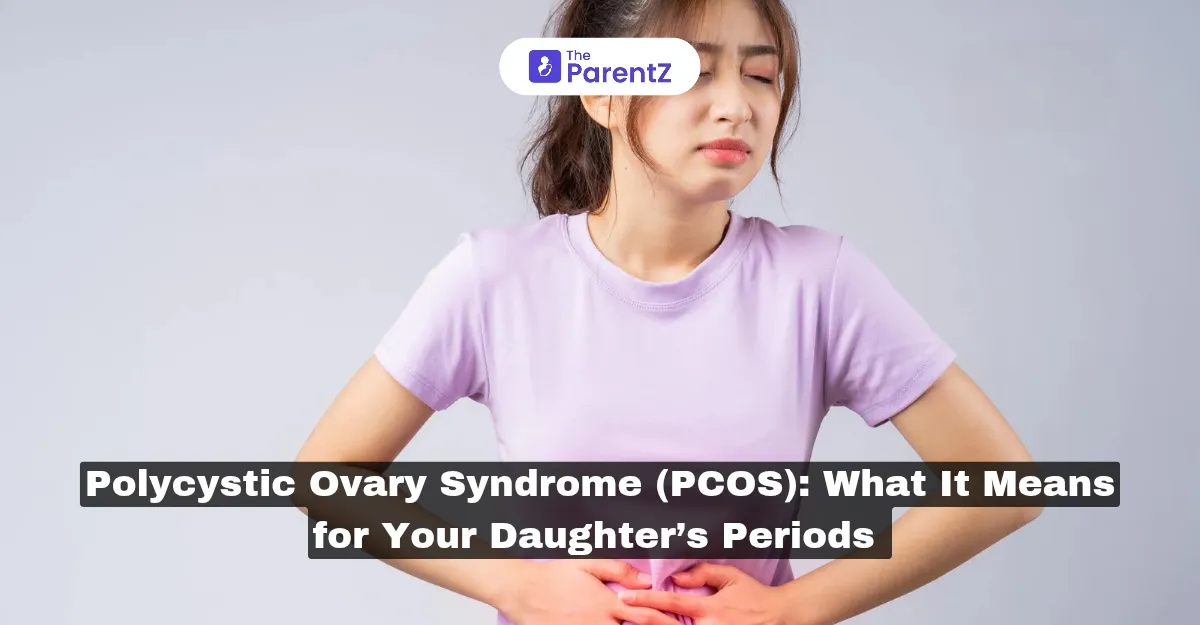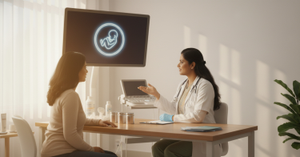As a parent, it’s natural to worry when your daughter’s periods seem out of sync. Maybe they come months apart, are heavier than usual, or bring along severe cramps and mood swings. If you’ve been noticing other changes like acne, excessive hair growth, or weight gain, then Polycystic Ovary Syndrome (PCOS) could be the reason. PCOS is one of the most common hormonal disorders in teenage girls, yet it’s often misunderstood or overlooked. But don’t worry, it’s manageable with the right care, lifestyle changes, and medical support.
What Is PCOS?
PCOS is a condition that affects how the ovaries function. It happens when the body produces higher-than-normal levels of androgens (male hormones), which can interfere with ovulation (the process where the ovary releases an egg each month).
Instead of releasing an egg regularly, the ovaries may develop small fluid-filled sacs (cysts) and fail to ovulate properly. This can cause irregular or skipped periods, making it difficult for the body to follow a normal menstrual cycle.
Signs That Your Daughter Might Have PCOS
PCOS looks different for every girl, but some of the most common symptoms include:
1. Irregular Periods
• Skipped periods or cycles longer than 35 days
• Heavy, prolonged bleeding when periods do happen
• Going months without a period and then suddenly having a very heavy one
2. Acne and Oily Skin
• Persistent, stubborn acne (especially on the face, chest, or back)
• Skin that seems extra oily, even with good hygiene
3. Excess Hair Growth (Hirsutism)
• Unwanted hair on the face, chest, stomach, or back due to high androgen levels
• Dark, coarse hair in places where men typically grow hair
4. Thinning Hair or Hair Loss
• Noticeable hair thinning on the scalp (similar to male-pattern baldness)
5. Weight Gain or Difficulty Losing Weight
• Unexplained weight gain, especially around the stomach area
• Struggles with losing weight despite diet and exercise
6. Dark Patches on the Skin
• Dark, velvety skin patches in areas like the neck, underarms, or groin (a sign of insulin resistance)
7. Mood Changes & Fatigue
• Feeling tired all the time
• Mood swings, anxiety, or depression
If your daughter has several of these symptoms, it’s time to consult a doctor to check for PCOS.
How Does PCOS Affect Periods?
Because PCOS disrupts ovulation, it directly affects the menstrual cycle. Instead of having regular monthly periods, a girl with PCOS might experience:
Infrequent or missing periods (sometimes going 2-6 months without one)
Long, heavy periods when they do occur
Extreme PMS symptoms, including bloating, fatigue, and severe cramps
Unpredictable spotting between cycles
This irregularity can make it difficult for her to track her period, leading to stress and anxiety about when it will happen next.
What Causes PCOS?
The exact cause of PCOS isn’t fully understood, but doctors believe it is linked to:
• Genetics – PCOS often runs in families. If you or another female relative has had it, your daughter might be more likely to develop it.
• Insulin Resistance – Many girls with PCOS have higher insulin levels, which can lead to weight gain and hormonal imbalances.
• Hormonal Imbalances – Increased androgens (male hormones) can disrupt ovulation and lead to PCOS symptoms.
While PCOS can’t be cured, it can be managed with the right approach.
How Can You Help Your Daughter Manage PCOS?
If your daughter is diagnosed with PCOS, don’t panic! While it may sound overwhelming, early management can prevent long-term health issues like diabetes, fertility problems, and heart disease.
1. Help Her Maintain a Balanced Diet
Encourage a diet rich in:
- High-fibre foods – Whole grains, vegetables, and legumes help regulate insulin.
- Lean proteins – Eggs, tofu, beans, and yogurt support hormone balance.
- Healthy fats – Avocados, nuts, and olive oil keep inflammation in check.
- Limit processed foods and sugars, which can worsen insulin resistance.
2. Encourage Regular Exercise
• Strength training and cardio help with insulin resistance and weight management.
• Even 30 minutes of daily movement (walking, yoga, or dancing) can improve symptoms.
3. Consider Medical Treatment
A doctor might recommend:
• Birth control pills to regulate periods and reduce androgen levels.
• Metformin, a medication that helps with insulin resistance.
• Anti-androgen medications to reduce excess hair growth and acne.
4. Support Her Emotionally
• PCOS can be frustrating and emotionally challenging, especially for a teenage girl.
• Reassure her that she’s not alone—many girls have PCOS, and it’s manageable.
• Help her track her symptoms so she can discuss them with a doctor.
5. Teach Her to Listen to Her Body
Encourage her to notice changes in her body—whether it’s her cycle, mood, or energy levels. Keeping a period tracker can help her stay informed about her health.
When to See a Doctor?
If your daughter’s period problems continue for more than a year or two after puberty, or if she experiences:
Severe period pain that disrupts daily life
Extreme acne that won’t go away with basic treatments
Unwanted hair growth or hair thinning
Rapid weight gain with no clear cause
Then it’s time to seek medical advice. Early diagnosis can prevent long-term health complications and make PCOS much easier to manage.
Final Thoughts
PCOS is a common condition, but it doesn’t have to take over your daughter’s life. With the right diet, exercise, and medical support, she can have regular periods, feel better, and stay healthy in the long run.
As a parent, the best thing you can do is offer support, listen, and encourage her to take charge of her health. Helping her understand PCOS now will set her up for a lifetime of better health and confidence.





Be the first one to comment on this story.